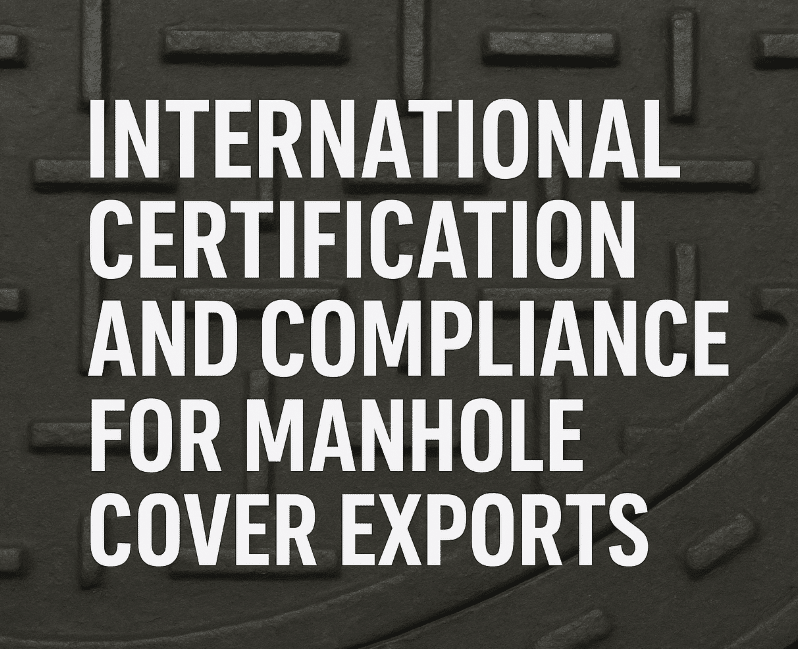The global trade of cast iron manhole covers plays a vital role in modern urban infrastructure. As these products are used in roads, drainage systems, and industrial facilities, ensuring that they meet international safety and performance standards is essential. For manufacturers and manhole cover exporters, understanding and complying with certification requirements can determine the success or failure of their export operations. This article explores the most common manhole cover certification, testing procedures, and compliance frameworks that ensure quality, durability, and safety in international trade.
Importance of Certification in the Manhole Cover Export Industry
In international markets, certification acts as a gateway to trade credibility. For cast iron manhole covers, certification ensures that products meet technical specifications and performance benchmarks demanded by import countries. Buyers, especially from Europe and North America, require strict compliance with standards such as EN124, AASHTO M306, or ISO 1083. These certifications help reduce liability, prevent installation failures, and build trust among engineering contractors and government clients. Without proper certification, even high-quality manhole covers may be rejected during customs inspection or tender qualification processes.
Common International Standards for Cast Iron Manhole Covers
To ensure global compatibility, manhole cover exporters must understand regional and international standards governing materials, loading capacity, and structural safety.
- EN124 (European Standard): Divides manhole covers into classes (A15 to F900) according to load-bearing capacity and installation area, from pedestrian zones to heavy-duty airports.
- AASHTO M306 (American Standard): Applies to gray and ductile iron covers used in roadways and utility access points, emphasizing impact resistance and structural performance.
- ISO 1083: Specifies material properties of spheroidal graphite cast iron (ductile iron), ensuring strength and corrosion resistance for long-term outdoor use.
Compliance with these standards allows manufacturers to trade freely across multiple markets while assuring end users of consistent quality.
Testing and Inspection Procedures for Export-Ready Manhole Covers
Before exporting, manhole cover manufacturers must undergo rigorous testing to verify compliance with international standards. Testing typically includes:
- Load-bearing tests: Measure the cover’s capacity to withstand specific weight classes, simulating traffic or industrial pressures.
- Impact tests: Assess the product’s resilience to sudden forces or heavy object drops.
- Material composition analysis: Ensures cast iron or composite materials meet mechanical property standards for tensile and yield strength.
- Corrosion and coating inspection: Evaluates protective surface treatments to resist rust and environmental degradation.
Third-party laboratories, such as SGS, TÜV, or Intertek, often issue certification reports recognized by global authorities. This process guarantees transparency and helps streamline customs clearance and tender documentation.
Key Compliance Documents for Manhole Cover Exporters
Documentation is a crucial part of international manhole cover trade. Exporters must prepare a comprehensive set of documents to prove compliance and quality control, including:
- Certificate of Conformity (CoC): Confirms compliance with relevant standards such as EN124 or ISO1083.
- Material Test Report (MTR): Lists chemical and mechanical test results from each production batch.
- Inspection Certificate: Issued by an independent agency verifying the shipment’s conformity.
- Origin and Quality Assurance Documents: Required for customs and buyer verification.
- CE Marking (for Europe): Indicates conformity with EU safety directives.
Proper documentation not only ensures smooth export operations but also reinforces a manufacturer’s professional image in global markets.
Regional Certification Requirements and Export Regulations
Different countries and regions impose specific compliance expectations for cast iron manhole covers:
- European Union: Requires EN124 certification and CE marking for all municipal products.
- United States: Accepts AASHTO M306 and ASTM A48 standards for cast and ductile iron covers.
- Middle East and Africa: Many infrastructure projects demand EN124-compliant products certified by SGS or Bureau Veritas.
- Southeast Asia: Governments often require local inspection reports or dual certification (local + international).
Understanding these regulations helps manhole cover exporters adapt product specifications and avoid trade barriers. Many successful exporters customize designs and load ratings according to local market conditions and engineering standards.
Building Trust and Competitive Advantage Through Compliance
Certification is not just a legal requirement — it’s a strategic marketing advantage. Exporters that consistently meet manhole cover standards demonstrate strong technical capability and product reliability. Highlighting certifications on packaging, websites, and trade fair materials helps build credibility among international buyers. Furthermore, investing in continuous testing and R&D allows manufacturers to expand from cast iron manhole covers into advanced materials like composite or stainless steel, targeting niche segments such as smart cities and high-traffic infrastructure.
In today’s competitive export landscape, compliance and quality assurance form the foundation for sustainable global partnerships.
Conclusion
Achieving full compliance with manhole cover certification and international standards is essential for long-term export success. Whether dealing with cast iron manhole covers or modern composite designs, adherence to established testing, documentation, and performance criteria ensures safety, reliability, and market access. As infrastructure investments grow worldwide, certified manufacturers will continue to lead in manhole cover trade, securing contracts and building trusted reputations across borders.
FAQ (Frequently Asked Questions)
1. What are the main standards for manhole cover exports?
The most recognized standards include EN124 (Europe), AASHTO M306 (USA), and ISO 1083 (International), each defining load capacities, materials, and testing methods.
2. Why is EN124 certification important for manhole covers?
EN124 ensures that manhole covers meet strict European safety and performance benchmarks, making it mandatory for projects funded by government or municipal agencies.
3. How can exporters prove product compliance?
Manufacturers must provide CoC, MTR, inspection certificates, and CE marking where applicable, verified by third-party testing organizations.
4. What are the benefits of third-party inspection?
Independent inspection adds credibility, guarantees product quality, and simplifies customs approval, enhancing buyer confidence.
5. Are cast iron and composite manhole covers certified under the same standards?
Both types can be certified under EN124, but their testing methods and material classifications differ due to variations in structural properties.





